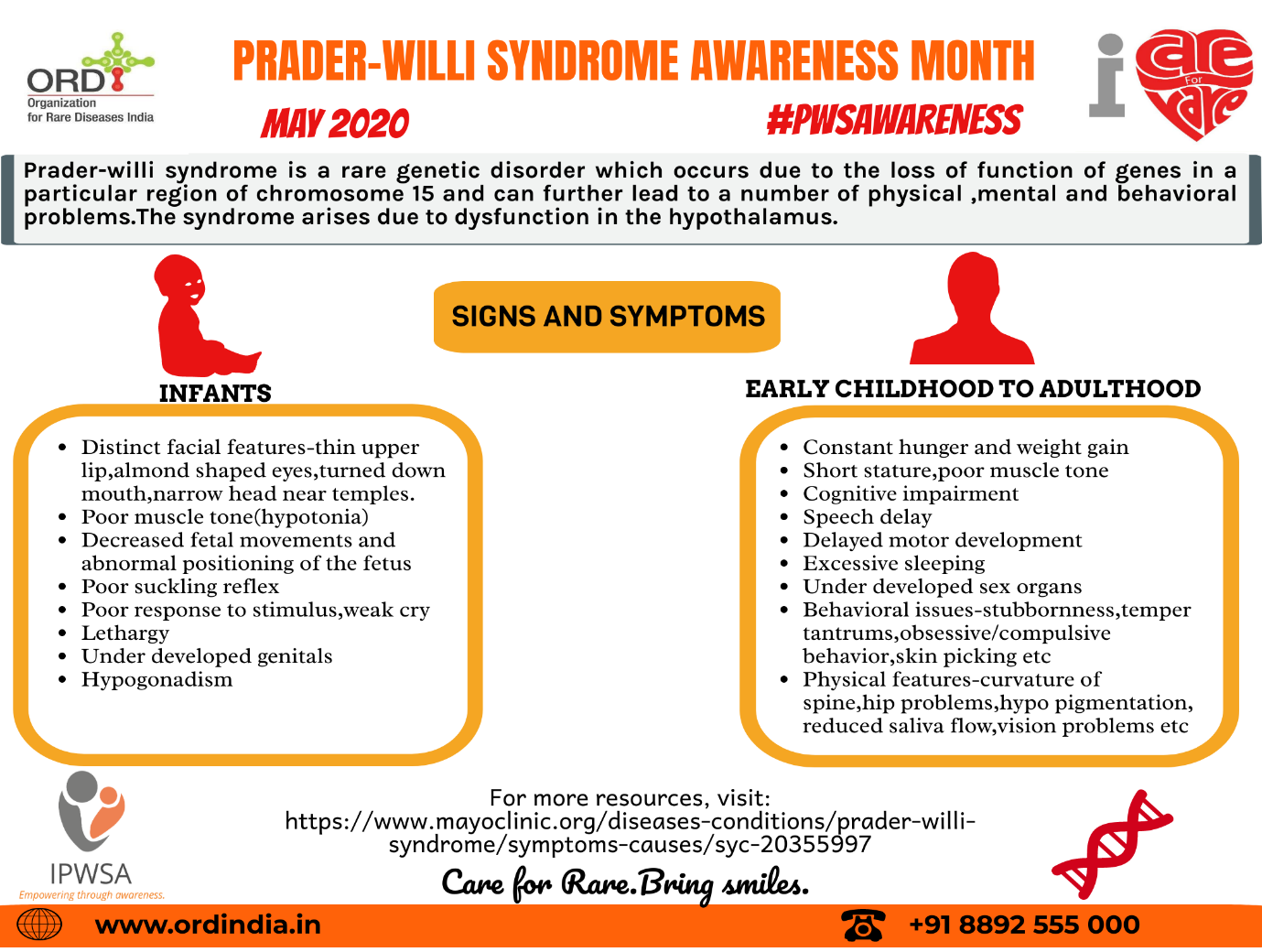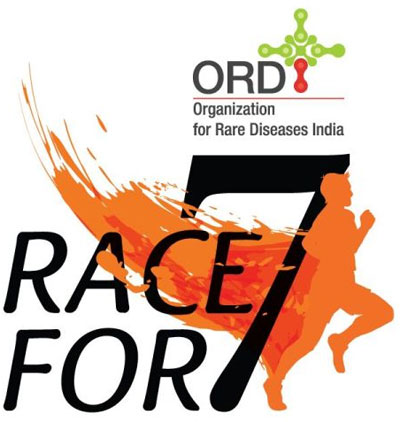Prader – Willi Syndrome
Prader – Willi syndrome is a genetic disorder affecting many parts of the body. It is rare and arises to loss of function of the genes in a definite region of chromosome 15 and leads to mental, physical and behavioral problems.
Signs and symptoms:
The symptoms are non- specific and is known to affect each person differently.
Figure 1: Signs and symptoms of Prader – Willi syndrome
There are certain complications associated with PWS as follows:
- People suffering from PWS have constant hunger and low muscle mass, hence need less calories and become less physically active. This leads to obesity and other medical conditions like- Sleep apnea, high cholesterol, high BP, Type 2 diabetes, gall bladder stones and high risk of liver and heart disease.
- Due to inadequate amount of hormone production in the body, person may suffer from sterility where they are unable to have children. Osteoporosis also occurs causing bones to become brittle and weak.
- Person suffering from PWS often binge eat leading to choking, pain in the stomach. Behavioral problems in children with PWS is often known to reduce the quality of life.
- Causes: PWS occurs due to error in one of more genes. It primarily occurs due to loss of active genes in a particular region of chromosome 15. Absence of paternal gene on chromosome 15, error /faulty paternal gene on the chromosome 15 or a case where the child inherits two copies of chromosome 15 from the mother and no chromosomes from the father.
Proper functioning of the hypothalamus region in the brain is affected due to the defect in chromosome 15, thus causes adverse effects with respect to growth, sexual development, body temperature, hunger, and sleep.
PWS in most cases is not inherited, especially in conditions which occur due to deletion in the paternal chromosome 15 or by maternal uniparental disomy.
Affected populations:
This syndrome has an incidence of affecting 1 in 10,000 or 30,000 individuals in a population and is known to affect both males and females. It is termed to be a very rare disease occurring in individuals.
Diagnosis:
Diagnosis is mainly dependent on the patient history and observation of characteristic symptoms in the affected individual.
Genetic testing is performed to detect to diagnose the condition and identify the specific genetic subtypes like imprinting defect, maternal disomy 15, 15q11-q13 deletions etc.
Fluorescent in situ hybridisation, DNA methylation tests and high-resolution chromosomal microarray techniques are involved in this process to detect deletions, duplications, rearrangements etc.
In cases of families with previous history of PWS, prenatal diagnosis is preferred.
Treatments:
Some of the procedures involved for treating PWS are as follows:
- Proper nutrition must be provided to the babies with PWS having feeding difficulty caused by reduced muscle tone. Doctors advise diet rich in calories and special feeding techniques for increasing the weight and development of the baby.
- Managing the weight of the child and by supplementing with proper vitamins and minerals for a balanced diet. Physical exercise is advised for managing the weight and enhance the proper functioning of the body.
- Human growth hormone (HGH) treatment- provided to child to improve the muscle tone, decrease the body fat, aid in the increase in growth of the child and improve mobility and respiratory function.
- Sex hormone treatment- replacement of sex hormones at puberty which aid in development of secondary sexual characteristics and enhance bone density. In males, testosterone replacement is performed; in females estrogen and progesterone replacement is performed to improve the levels of hormones.
- Eye check-ups are recommended to check for abnormalities in eyes. Treatment for sleep disturbances is provided to treat sleep apnea and behavioural issues. Evaluation of children with scoliosis. hip dysplasia, hypothyroidism or diabetes is performed.
- Physical therapy involved in treating and improvement of motor skills, speech therapy for verbal skills, occupational therapy is provided to improve everyday skills.
- Developmental therapy is provided to improve interpersonal skills, social skills, and behaviour. Medications are provided in some cases to manage behavioral problems.
- Mental health care -treatment given for psychological problems like mood disorders, picking of skin and obsessive- compulsive disorders.
Other names for this condition:
- PWS
- Willi – Prader syndrome
- Prader – Labhart – Willi syndrome
References:
- https://www.mayoclinic.org/diseases-conditions/prader-willi-syndrome/symptoms-causes/syc-20355997
- https://rarediseases.org/rare-diseases/prader-willi-syndrome/
- https://www.nhs.uk/conditions/prader-willi-syndrome/
We appreciate the efforts of Ms. Panchami.P, MSc. BMG, VIT, Vellore in curating the content for Prader – Willi syndrome.
Last updated: 13th July 2021




